Charles E W Bean, Diaries, AWM38 3DRL 606/256/1 - 1915 - 1936 - Part 13
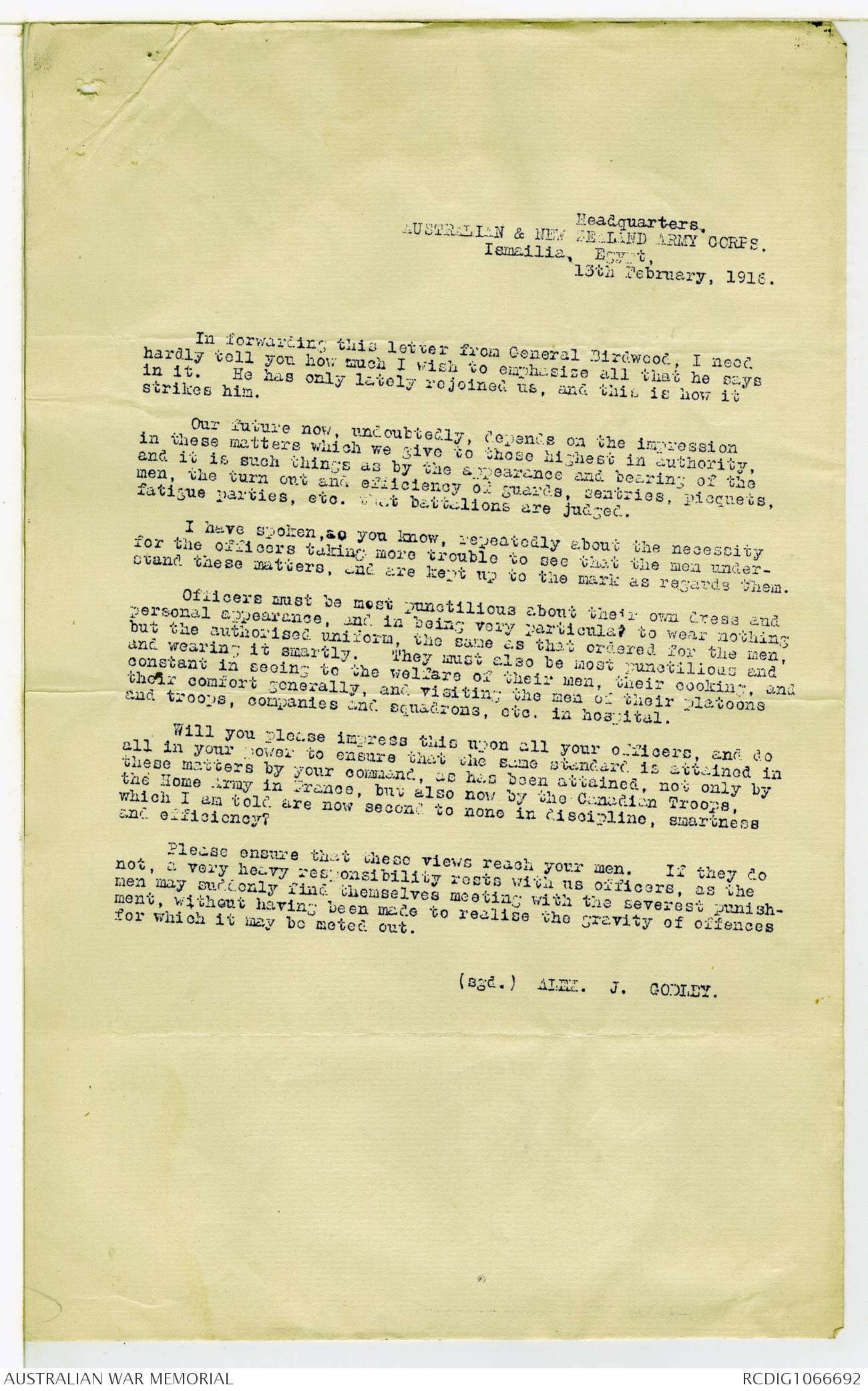
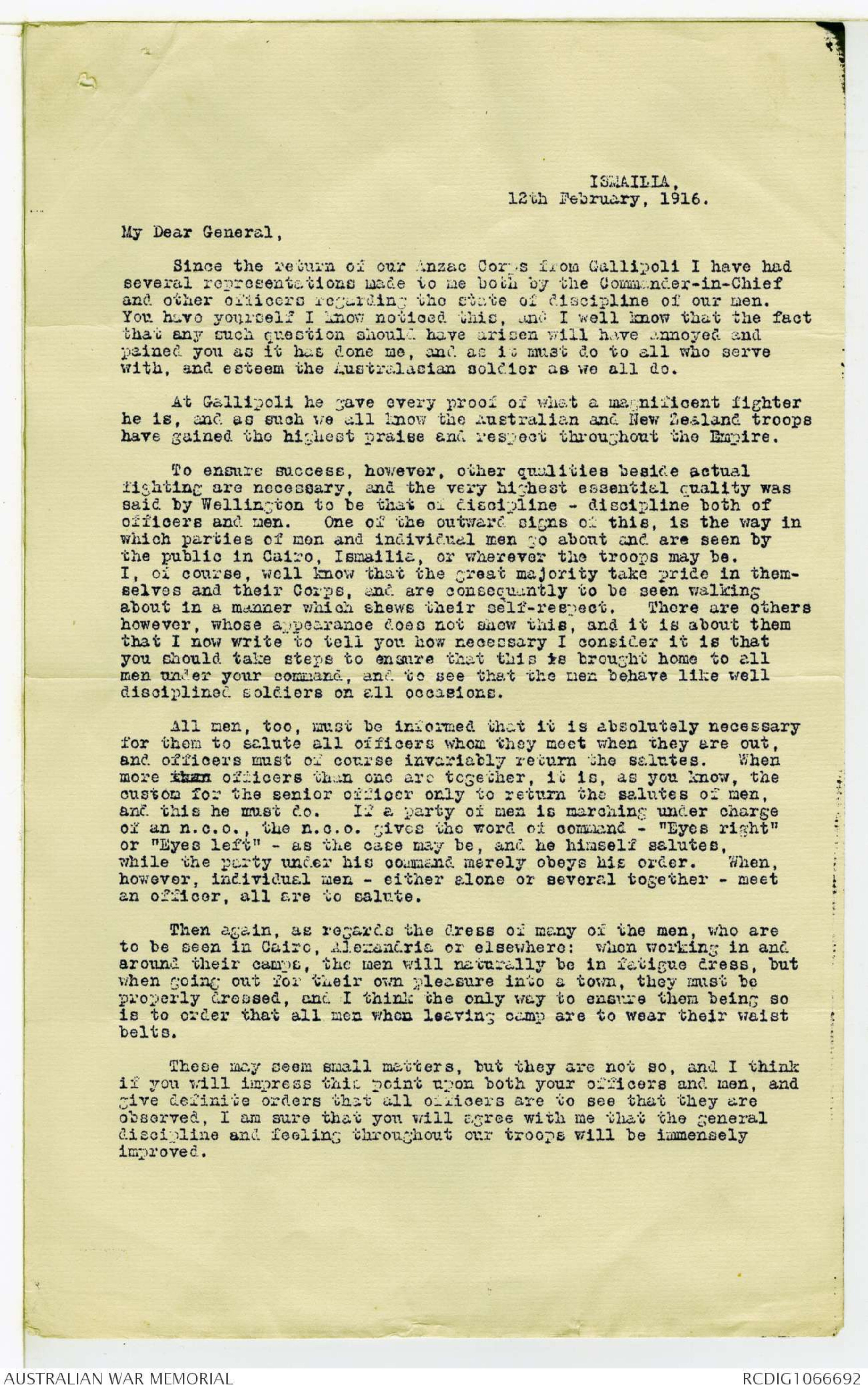
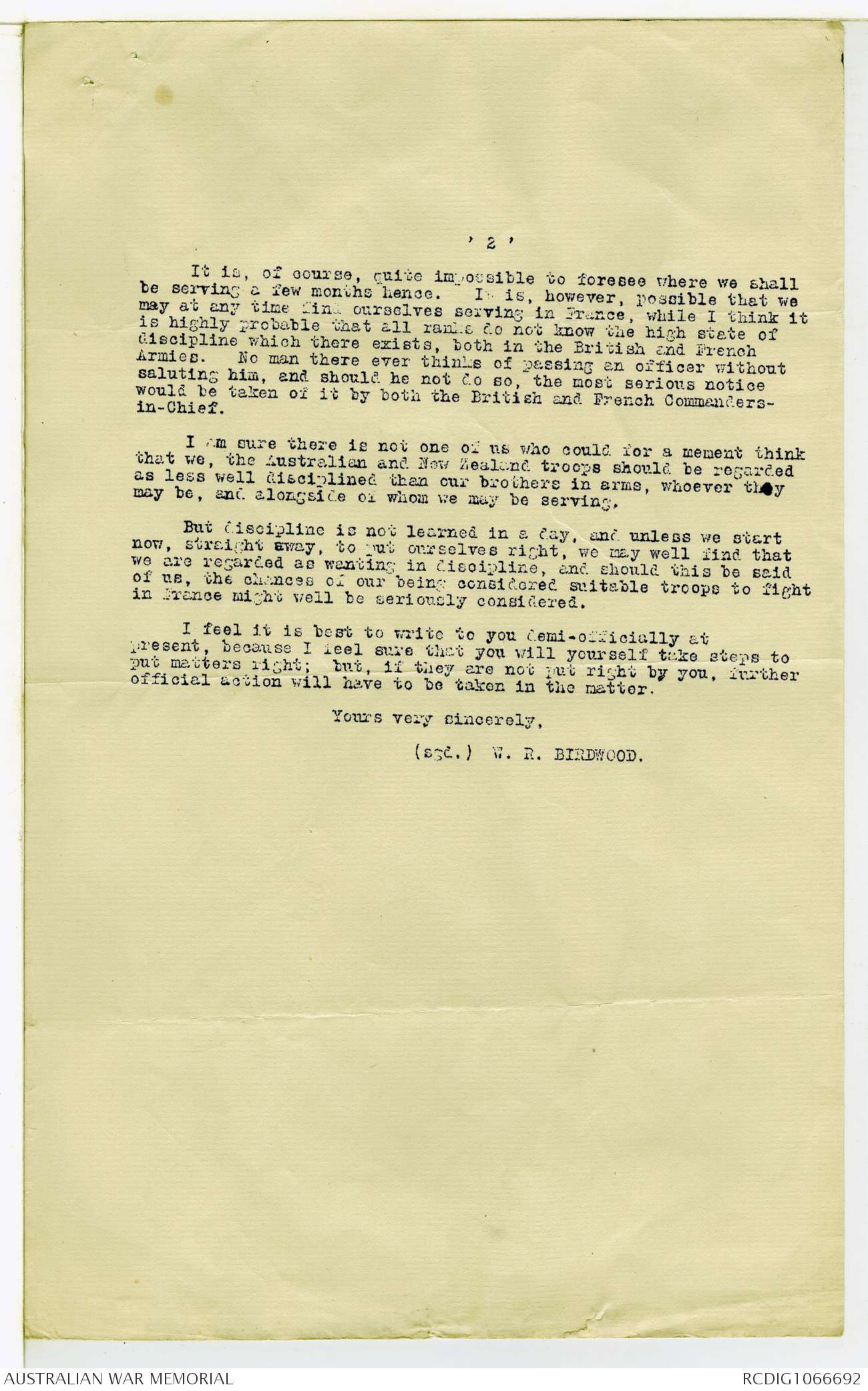
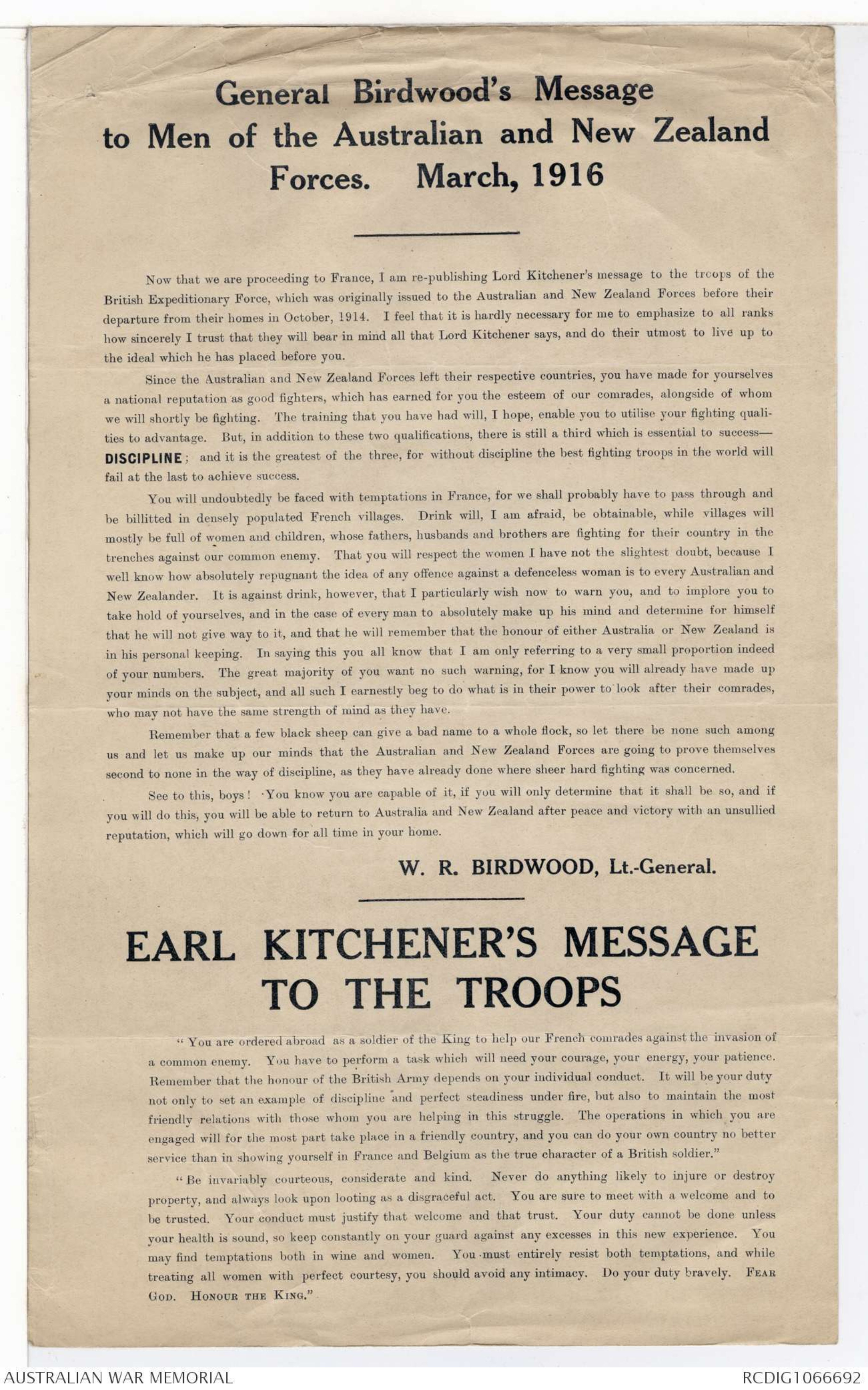
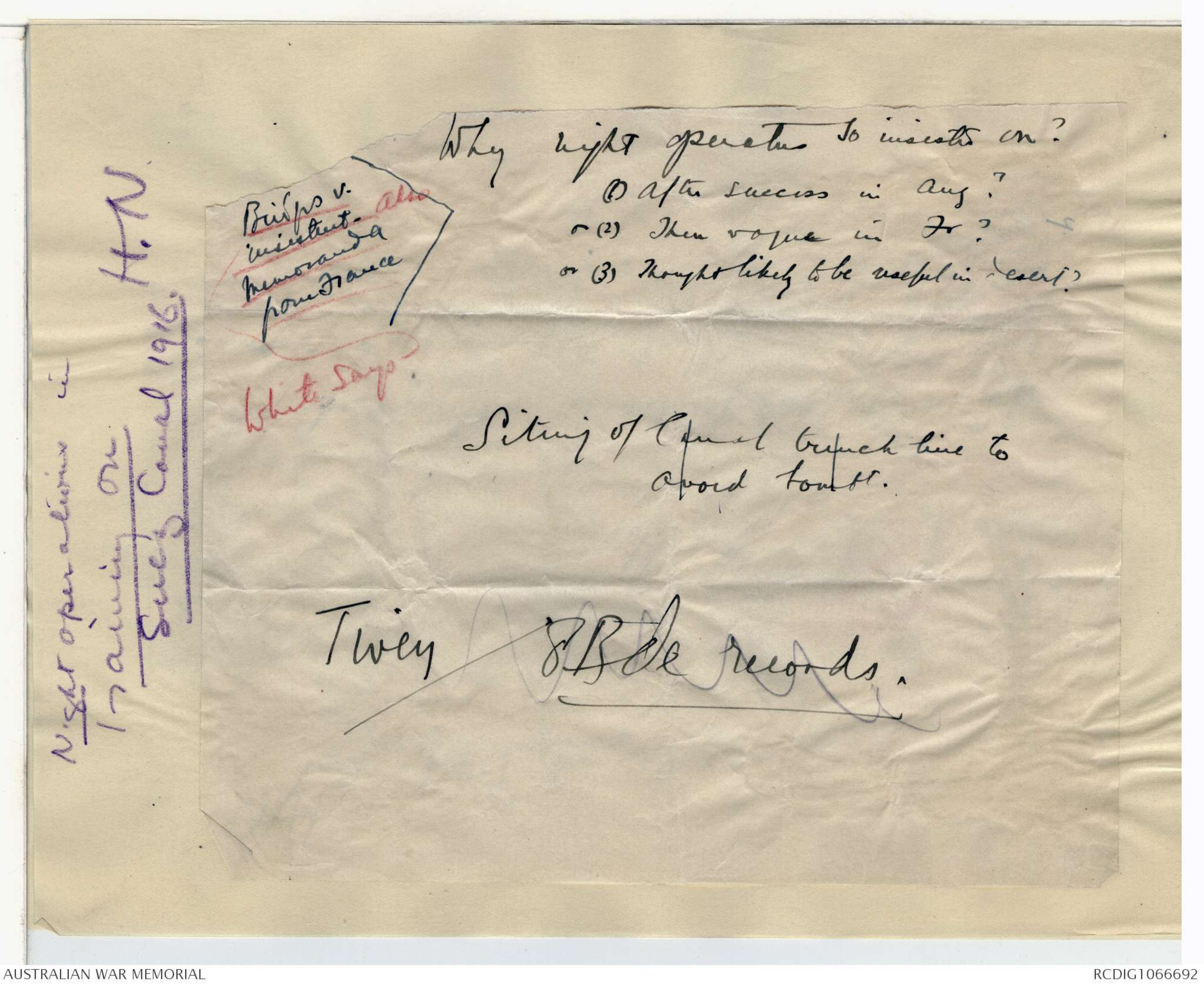
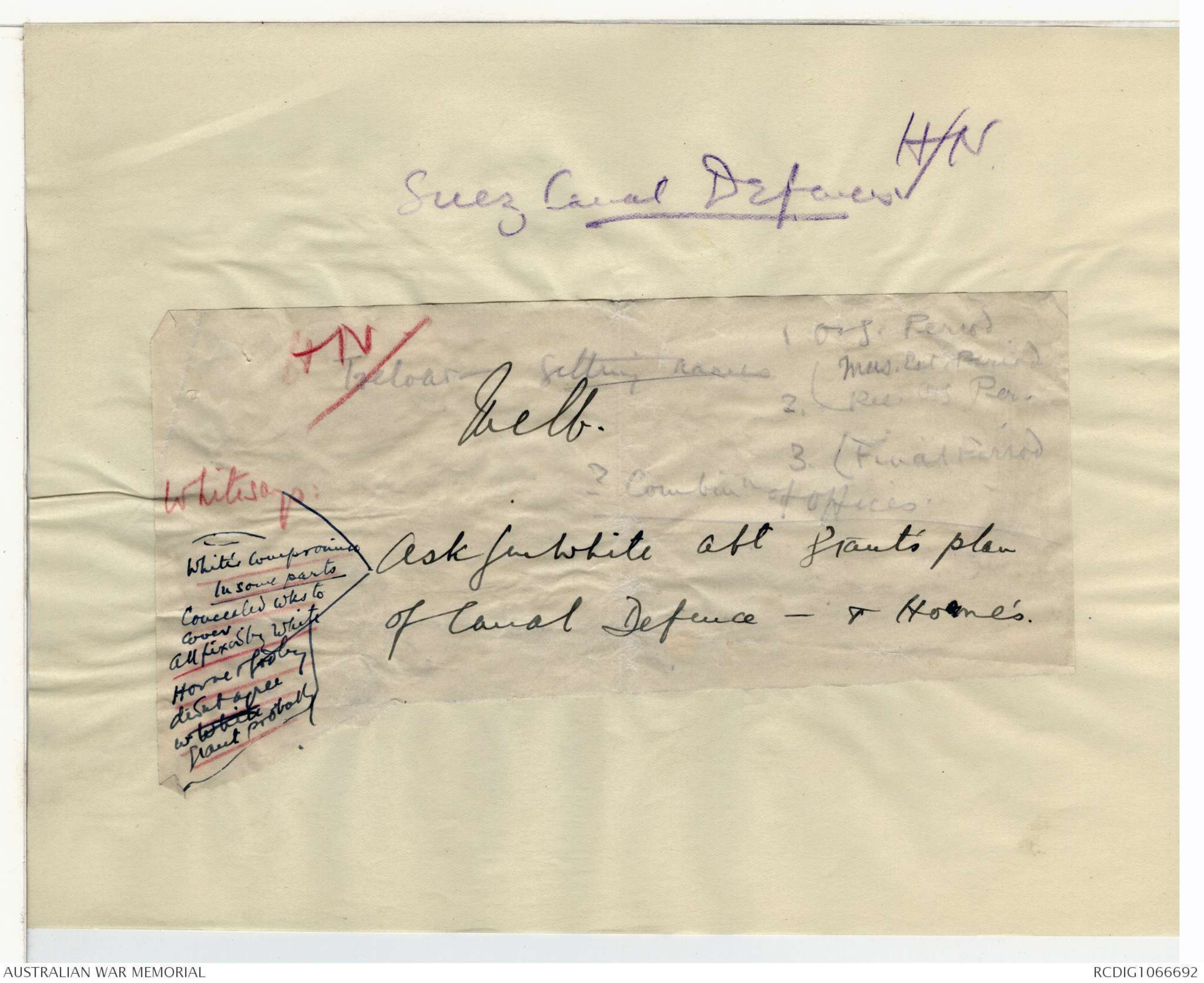
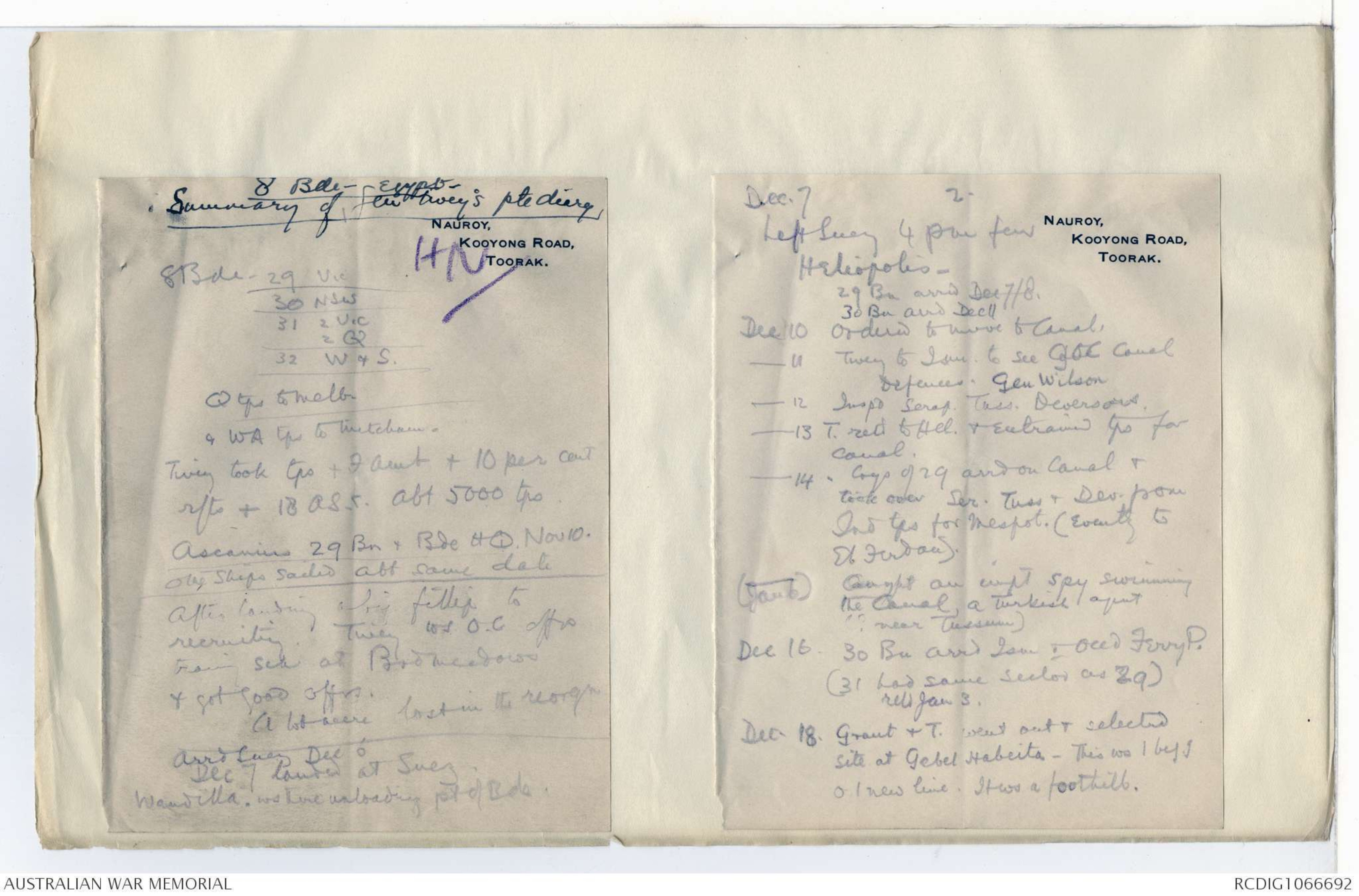
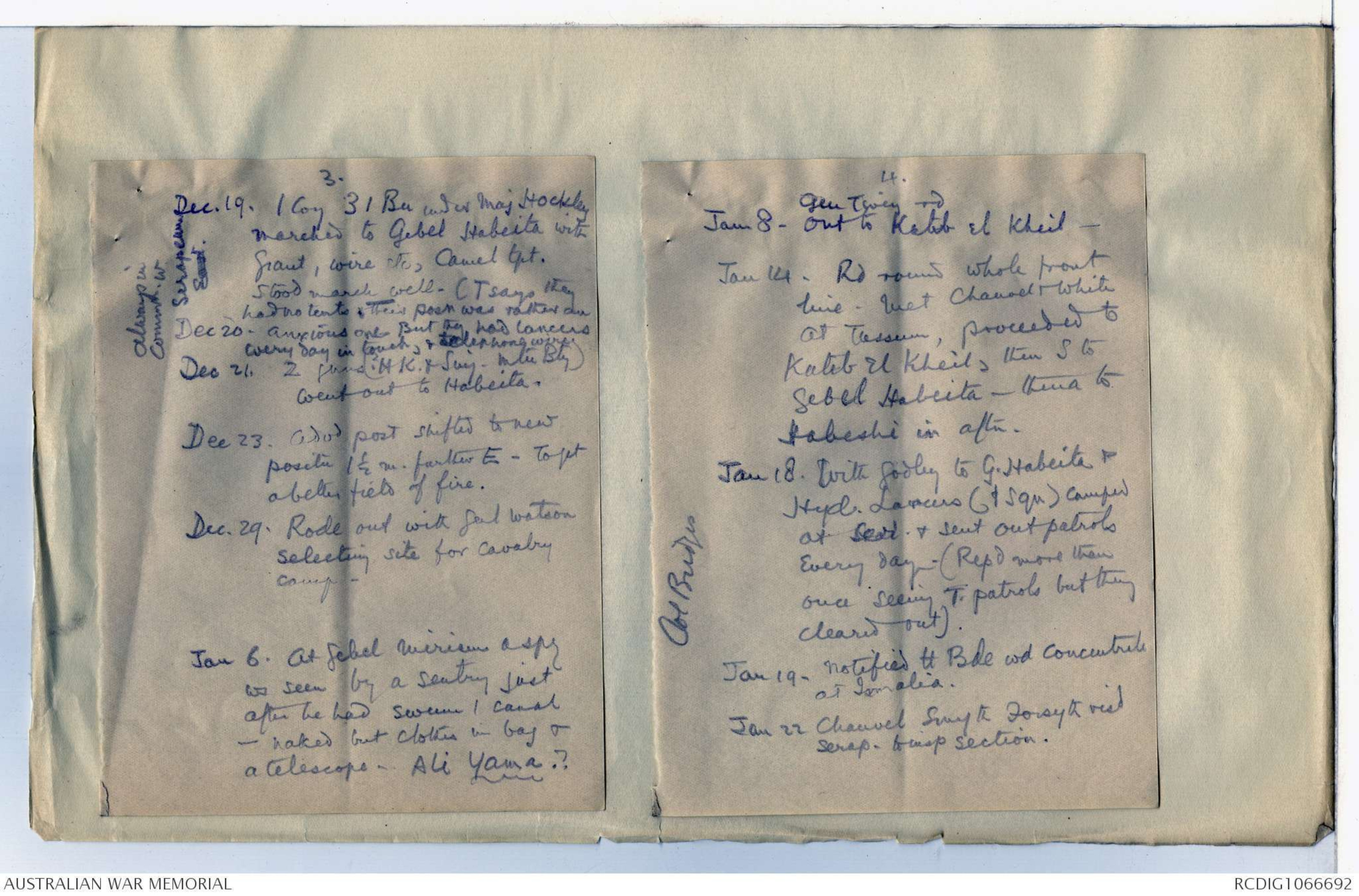
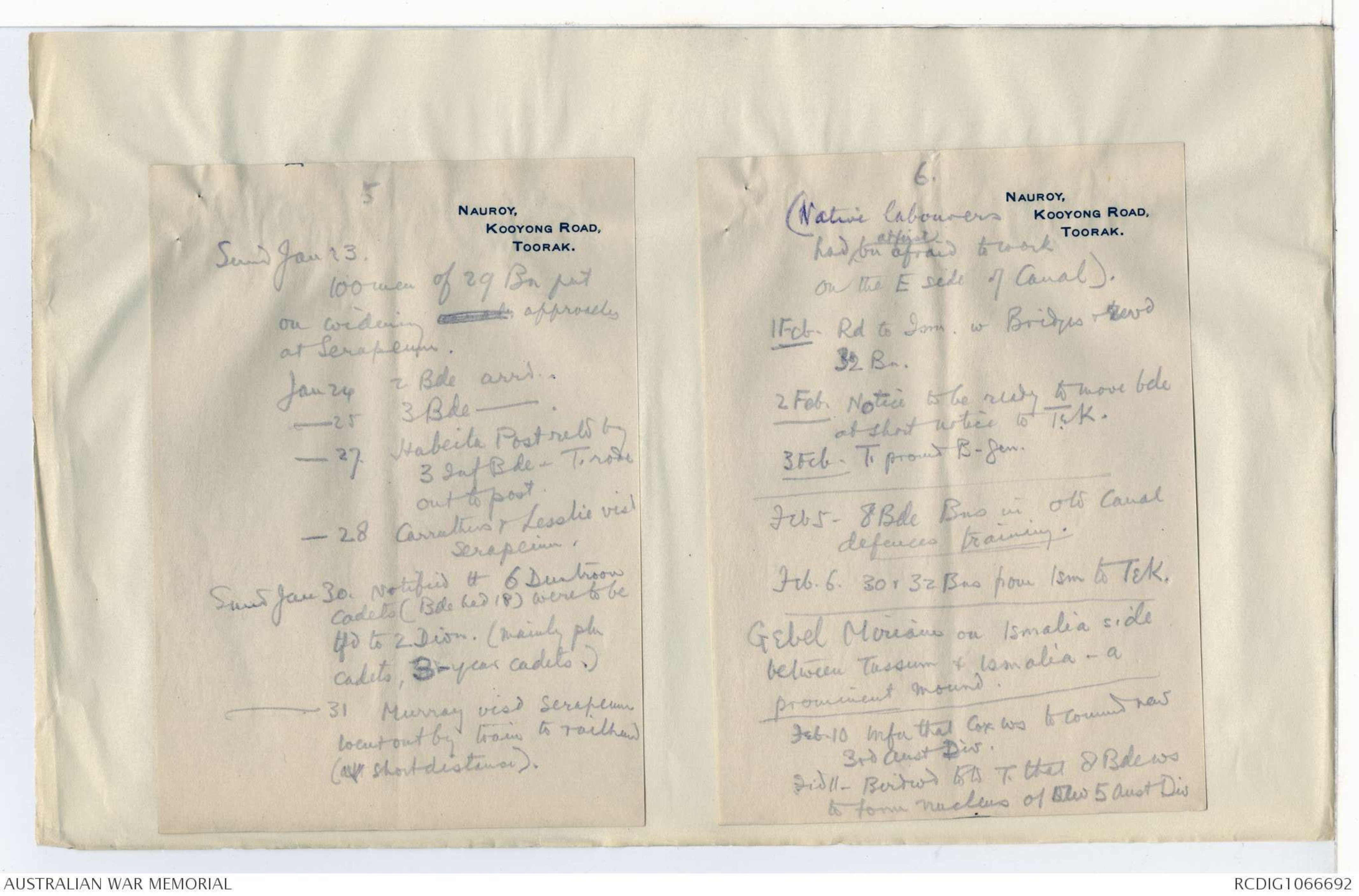
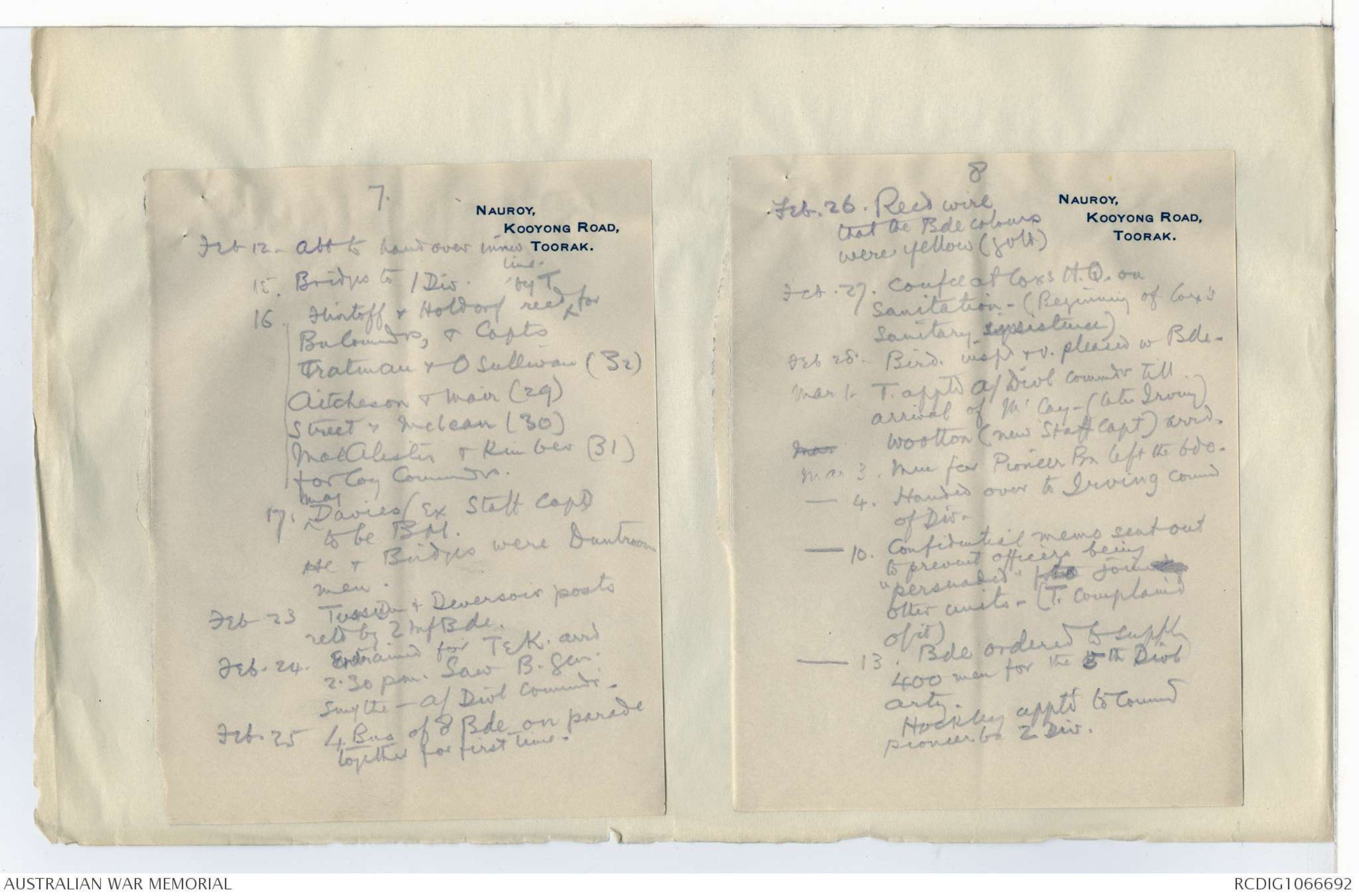
Headquarters,
AUSTRALIAN & NEW ZEALAND ARMY CORPS.
Ismailia, Egypt,
13th February, 1916.
In forwarding this letter from General Birdwood, I need
hardly tell you how much I wish to emphasize all that he says
in it. He has only lately rejoined us, and this is how it
strikes him.
Our future now, undoubtedly, depends on the impression
in these matters which we give to those highest in authority,
and it is such things as by the appearance and bearing of the
men, the turn out and efficiency of guards, sentries, piquet's,
fatigue parties, etc. that battalions are judged.
I have spoken, so you know, repeatedly about the necessity
for the officers taking more trouble to see that the men
understand these matters, and are kept up to the mark as regards them.
Officers must be most punctilious about their own dress and
personal appearance, and in being very particular to wear nothing
but the authorised uniform, the same as that ordered for the men,
and wearing it smartly. They must also be most punctilious and
constant in seeing to the welfare of their men, their cooking, and
their comfort generally, and visiting the men of their platoons
and troops, companies and squadrons, etc. in hospital.
Will you please impress this upon all your officers, and do
all in your power to ensure that the same standard is attained in
these matters by your command, as has been attained, not only by
the Home Army in France, but also now by The Canadian Troops
which I am told are now second to none in discipline, smartness
and efficiency?
Please ensure that these views reach your men. If they do
not, a very heavy responsibility rests with us officers, as the
men may suddenly find themselves meeting with the severest
punishment, without having been made to realise the gravity of offences
for which it may be meted out.
(sgd.) ALEX. J. GODLEY.
ISMAILIA,
12th February, 1916.
My Dear General,
Since the return of our Anzac Corps from Gallipoli I have had
several representations made to me both by the Comander-in-Chief
and other officers regarding the state of discipline of our men.
You have yourself I know noticed this, and I well know that the fact
that any such question should have arisen will have annoyed and
pained you as it has done me, and as it must do to all who serve
with, and esteem the Australasian soldier as we all do.
At Gallipoli he gave every proof of what a magnificent fighter
he is, and as such we all know the Australian and New Zealand troops
have gained the highest praise and respect throughout the Empire.
To ensure success, however, other qualities beside actual
fighting are necessary, and the very highest essential quality was
said by Wellington to be that of discipline - discipline both of
officers and men. One of the outward signs of this, is the way in
which parties of men and individual men go about and are seen by
the public in Cairo, Ismailia, or wherever the troops may be.
I, of course, well know that the great majority take pride in
themselves and their Corps, and are consequently to be seen walking
about in a manner which shows their self-respect. There are others
however, whose appearance does not show this, and it is about them
that I now write to tell you how necessary I consider it is that
you should take steps to ensure that this is brought home to all
men under your command, and to see that the men behave like well
disciplined soldiers on all occasions.
All men, too, must be informed that it is absolutely necessary
for them to salute all officers whom they meet when they are out,
and officers must of course invariably return the salutes. When
more than officers than one are together, it is, as you know, the
custom for the senior officer only to return the salutes of men,
and this he must do. If a party of men is marching under charge
of an n.c.o., the n.c.o. gives the word of command - "Eyes right"
or "Eyes left" - as the case may be, and he himself salutes,
while the party under his command merely obeys his order. When,
however, individual men - either alone or several together - meet
an officer, all are to salute.
Then again, as regards the dress of many of the men, who are
to be seen in Cairo, Alexandria or elsewhere: when working in and
around their camps, the men will naturally be in fatigue dress, but
when going out for their own pleasure into a town, they must be
properly dressed, and I think the only way to ensure them being so
is to order that all men when leaving camp are to wear their waist
belts.
These may seem small matters, but they are not so, and I think
if you will impress this point upon both your officers and men, and
give definite orders that all officers are to see that they are
observed, I am sure that you will agree with me that the general
discipline and feeling throughout our troops will be immensely
improved.
' 2 '
It is, of course, quite impossible to foresee where we shall
be serving a few months hence. It is, however, possible that we
may at any time find ourselves serving in France, while I think it
is highly probable that all ranks do not know the high state of
discipline which there exists, both in the British and French
Armies. No man there ever thinks of passing an officer without
saluting him, and should he not do so, the most serious notice
would be taken of it by both the British and French Commanders-
in-Chief.
I am sure there is not one or us who could for a moment think
that we, the Australian and New Zealand troops should be regarded
as less well disciplined than our brothers in arms, whoever they
may be, and alongside of whom we may be serving.
But discipline is not learned in a day, and unless we start
now, straight away, to put ourselves right, we may well find that
we are regarded as wanting in discipline, and should this be said
of us, the chances of our being considered suitable troops to fight
in France might well be seriously considered.
I feel it is best to write to you demi-officially at
present, because I feel sure that you will yourself take steps to
put matters right; but, if they are not put right by you, further
official action will have to be taken in the matter.
Yours very sincerely,
(sgd.) W. R. BIRDWOOD.
General Birdwood’s Message
to Men of the Australian and New Zealand
Forces. March 1916
Now that we are proceeding to France, I am re-publishing Lord Kitchener's message to the troops of the
British Expeditionary Force, which was originally issued to the Australian and New Zealand Forces before their
departure from their homes in October, 1914. I feel that it is hardly necessary for me to emphasize to all ranks
how sincerely I trust that they will bear in mind all that Lord Kitchener says, and do their utmost to live up to
the ideal which he has placed before you.
Since the Australian and New Zealand Forces left their respective countries, you have made for yourselves
a national reputation as good fighters, which has earned for you the esteem of our comrades, alongside of whom
we will shortly be fighting. The training that you have had will, I hope, enable you to utilise your fighting
qualities to advantage. But, in addition to these two qualifications, there is still a third which is essential to success—
DISCIPLINE; and it is the greatest of the three, for without discipline the best fighting troops in the world will
fail at the last to achieve success.
You will undoubtedly be faced with temptations in France, for we shall probably have to pass through and
be billitted in densely populated French villages. Drink will, I am afraid, be obtainable, while villages will
mostly be full of women and children, whose fathers, husbands and brothers are fighting for their country in the
trenches against our common enemy. That you will respect the women I have not the slightest doubt, because I
well know how absolutely repugnant the idea of any offence against a defenceless woman is to every Australian and
New Zealander. It is against drink, however, that I particularly wish now to warn you, and to implore you to
take hold of yourselves, and in the case of every man to absolutely make up his mind and determine for himself
that he will not give way to it, and that he will remember that the honour of either Australia or New Zealand is
in his personal keeping. In saying this you all know that I am only referring to a very small proportion indeed
of your numbers. The great majority of you want no such warning, for I know you will already have made up
your minds on the subject, and all such I earnestly beg to do what is in their power to look after their comrades,
who may not have the same strength of mind as they have.
Remember that a few black sheep can give a bad name to a whole flock, so let there be none such among
us and let us make up our minds that the Australian and New Zealand Forces are going to prove themselves
second to none in the way of discipline, as they have already done where sheer hard fighting was concerned.
See to this, boys ! You know you are capable of it, if you will only determine that it shall be so, and if
you will do this; you will be able to return to Australia and New Zealand after peace and victory with an unsullied
reputation, which will go down for all time in your home.
W.R. BIRDWOOD, Lt.-General.
EARL KITCHENER’S MESSAGE
TO THE TROOPS
"You are ordered abroad as a soldier of the King to help our French comrades against the invasion of
a common enemy. You have to perform a task which will need your courage, your energy, your patience.
Remember that the honour of the British Army depends on your individual conduct. It will be your duty
not only to set an example of discipline and perfect steadiness under fire, but also to maintain the most
friendly relations with those whom you are helping in this struggle. The operations in which you are
engaged will for the most part take place in a friendly country, and you can do your own country no better
service than in showing yourself in France and Belgium as the true character of a British soldier.
"Be invariably courteous, considerate and kind. Never do anything likely to injure or destroy
property, and always look upon looting as a disgraceful act. You are sure to meet with a welcome and to
be trusted. Your conduct must justify that welcome and that trust. Your duty cannot be done unless
your health is sound, so keep constantly on your guard against any excesses in this new experience. You
may find temptations both in wine and women. You must entirely resist both temptations, and while
treating all women with perfect courtesy, you should avoid any intimacy. Do your duty bravely. FEAR
GOD. HONOUR THE KING."
Why night operatns so insisted on?
(1) After success in Aug?
or (2) Then vogue in Fr?
or (3) Thought likely to be useful in desert?
Siting of Canal trench line to
avoid bombt.
Tivey 8 Bde records.
Bridges v.
insistent. Also
Memoranda
from France
White says.
[*Night operations in
Training on
Suez Canal 1916. H.N.*]
Suez Canal Defence H/N
H.N.
Treloar - Getting names
1 Org. Period
(Mus. Est Period)
2.( Rec OS Per.
3. (Final Period)
? Combinn of offices.
Melb.
Ask Gen White abt Grant's plan
of Canal Defence - & Horne's.
[* White says:
White’s compromise
In some parts
Concealed wks to
Cover.
All fixed by White
Horne & Godley
didnt agree
w White
Grant probably*]
8 Bde - Egypt-
Summary of Gen Tivey's pte diary
NAUROY,
KOOYONG ROAD,
TOORAK.
HN
8Bde. 29 Vic
30 NSW
31 2 Vic
2 Q
32 W & S.
Q tps to Melb.
& WA tps to Mitcham.
Tivey took tps & F Amb & 10 per cent
rfts & 18 ASS. Abt 5000 tps.
Ascanins 29 Bn & Bde HQ. Nov 10.
other ships sailed abt same date
After landing a big fillige to
recruiting. Tivey ws O.C. Offrs
training site at Broadmeadows
& got good offrs.
A lot were lost in the reorgn
Arrd Suez Dec 6
Dec 7 landed at Suez.
Mandilla. ws there unloading pt of Bde.
2.
Dec. 7
NAUROY,
KOOYONG ROAD,
TOORAK.
Left Suez 4 pm for
Heliopolis -
29 Bn arrd Dec 7/8.
30 Bn arrd Dec 11
Dec 10 Ordered to move to Canal,
____ 11 Tivey to Ism. to see GOC Canal
Defences. Gen Wilson
____ 12 Inspd Seraf. Tuss. Deversons.
____ 13 T. ret. to Hel. & entrained tps for
Canal.
____ 14. Coys of 29 arrd on Canal &
took over Ser. Tuss & Dev. from
Ind tps for Mespot. (evently to
El Ferdau).
(Jan 6) Caught an impt spy swimming
the Canal, a Turkish agent
? near Tussum)
Dec 16. 30 Bn arrd Ism & occd Ferry P.
(31 had same Sector as 29)
reld Jan 3.
Dec 18. Grant & T. went out & selected
site at Gebel Habeita - This ws / begg
o / new line. It ws a foothill.
3.
Dec 19. 1 Coy 31 Bn under Maj Hockley
marched to Gebel Habeita with
Grant, wire etc, Camel tpt.
Stood march well. (T says they
had no tents. Their post was rather an
Dec 20. anxious one. But they had lancers
every day in touch, & telephone wire.
[*Always in
commn. w
SerapeumEast.*]
Dec 21. 2 guns.(?HK. & Sig- Mtn Bty)
went out to Habeita.
Dec 23. Advd post shifted to new
positn 1½ m. further E - To get
a better field of fire.
Dec. 29. Rode out with Genl Watson
selecting site for Cavalry
camp.
Jan 6. At Gebel Miriam a spy
ws seen by a Sentry just
after he had swum / canal
- naked but clothes in bag &
a telescope. Ali Yama.?
4.
Jan 8 - Gen Tivey rd out to Kelib el Kheil -
Jan 14. Rd round whole front
line. Met Chauvel & White
at Tressum, proceeded to
Kalib El Kheil, then S to
Gebel Habeita - then to
Habeshi in aftn.
Jan 18. With Godley to G.Habeita &
Hyd. Lancers (1 Sqn) camped
at Ser. & sent out patrols
every day. (Repd more than
once seeing T. patrols but they
cleared out).
[*Col Bridges*]
Jan 19. notified tt Bde wd concentrate
at Ismalia.
Jan 22. Chauvel Smyth Forsyth visd
Serap. to insp section.
5.
NAUROY,
KOOYONG ROAD,
TOORAK.
Sund Jan 13.
100 men of 29 Bn put
on widening was at approaches
at Serapeum.
Jan 24. 2 Bde arrvd.
___ 25. 3 Bde _______.
___ 27. Habeita Post reld by
3 Inf Bde - T. rode
out to post.
___ 28. Carruthers & Lesslie vist
Serapeim.
Sund Jan 30. Notified tt 6 Duntroon
Cadets (Bde had 18) were to be
tfd to 2. Divn. (mainly pln
Cadets, 3-year cadets.)
___ 31 Murray visd Serapeum
to cut out by train to railhead
(all short distance).
6.
NAUROY,
KOOYONG ROAD,
TOORAK.
(Native labourers
had ^at first bn afraid to work
on the E side of Canal).
1 Feb. Rd to Ism. w Bridges & revd.
32 Bn.
2 Feb. Notice to be ready to move Bde
at short notice to T.eK.
3 Feb. T. promd B-Gen.
Feb 5 - 8 Bde Bns in old Canal
defences training.
Feb.6. 30 & 32 Bns from Ism to TeK.
Gebel Miriam on Ismalia side
between Tussum & Ismalia - a
prominent mound.
Feb. 10 Infn that Cox ws to commd new
3rd Aust Div.
Fid 11 - Birdwood told T. that 8 Bde ws
to form nucleus of Btn 5 Aust Div
7.
NAUROY.
KOOYONG ROAD,
TOORAK.
Feb 12. Abt to hand over inner line.
15. Bridges to / Div.
16. Flintoff & Holdorf recd ^by T for
Bn Commdrs, & Capts
Tratman & O Sullivan (32)
Aitcheson & Mair (29)
Street & Mclean (30)
MacAlister & Kimber (31)
for Coy Commdr.
17.^May Davies (ex Staff Capt)
to be BM.
He & Bridges were Duntroon
men.
Feb 23 Tussum & Deversons posts
reld by 2 Inf Bde.
Feb. 24. Entrained for TeK. arrd
2.30 p.m. Saw B. Gen.
Smythe - A/ Divl. Commdr.
Feb 25 4 Bns of 8 Bde on parade
together for first time.
8.
NAUROY,
KOOYONG ROAD,
TOORAK.
Feb. 26. Recd wire
that the Bde colours
were yellow (gold)
Feb. 27. Confce at Cox's H.Q. on
Sanitation - (Beginning of Cox's
Sanitary insistence)
Feb 28. Bird inspd & v. pleased w Bde.
Mar 1. T. apptd A/Divl Commdr till
arrival of McCay - (later Irving)
Mar Wootton (new Staff Capt) arrd.
Mar 3. Men for Pioneer Bn left the bde.
___ 4. Handed over to Irving Commd
of Div.
___ 10. Confidential memo sent out
to prevent officers being
"persuaded" xxto joining
other units - (T. complained
of it)
___ 13. Bde ordered to supply
400 men for the 5th Divl
Arty.
Hockley apptd to Commd
Pioneer bn 2 Div.
 Sandy Mudie
Sandy MudieThis transcription item is now locked to you for editing. To release the lock either Save your changes or Cancel.
This lock will be automatically released after 60 minutes of inactivity.